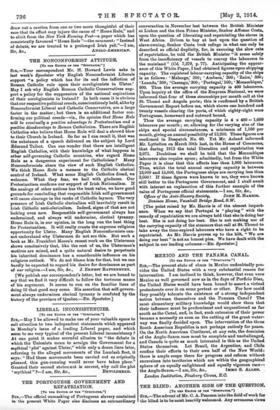THE PORTUGUESE GOVERNMENT AND REPATRIATION. [To Tax Erma 07 Tor
"Rrawon'7 Sin,—The official unmasking of Portuguese slavery contained in the present White Paper also discloses an extraordinary conversation in November last between the British Minister at Lisbon and the then Prime Minister, Senhor Affonso Costa, upon the question of liberating and repatriating the slaves in West Africa. Driven to bay at last upon the question of slave-owning, Senhor Costa took refuge in what can only be described as official duplicity, for, in excusing the slow rate of repatriation, he told the British Minister "it arose solely from the insufficiency of vessels to convey the labourers to the mainland" (Cd. 7,279, p. 77). Anticipating the appear- ance of this White Paper, I had obtained figures upon shipping capacity. The registered labour-carrying capacity of the ships is as follows : ' Melange,' 300; Ambaca,' 300; ' Zaire,' 300; ' Loanda,' 300; ' Casengo,' 300 ; ' Portugal,' 500; ' Mocambique,' 800. Thus the average carrying capacity is 400 labourers. Upon inquiry at the office of the Empreza Nacional, we were informed that four of these steamships per month call at the St. Thome and Angola ports; this is confirmed by a British Government Report before me, which shows one hundred and twenty vessels clearing the ports, of which eighty-eight were Portuguese, homeward and outward bound.
Thus the average carrying capacity is 4 x 400 = 1,600 labourers per month ; or, allowing for the varying size of the ships and special circumstances, a minimum of 1,100 per month, giving an anneal possibility of 13,200. These figures are confirmed in Despatch No. 60. Yet Mr. Acland informed Mr. Lyttelton on March 30th last, in the House of Commons, that during 1913 the total liberation and repatriation was 2,071. Doubtless we shall be told that the Mozambique labourers also require space; admittedly, but from the White Paper it is clear that this affects less than 1,000 labourers. Thus, whilst the total annual carrying capacity is between 13,000 and 15,000, the Portuguese ships are carrying less than 3,000! If these figures were known to me, they were known still better to the Portuguese Government, and I shall await with interest an explanation of this further example of the value of Portuguese official statements.—I am, Sir, &c.,
Offices of the Anli-Slavery Society, JOHN H. HARRIS. Denison House, Venetian Bridge Road, S.W.
[The point raised by Mr. Harris is of the utmost import• ance. When we say that Portugal is " playing " with the remedy of repatriation we are always told that she is doing her best. She is not doing her best. She is not making use of the carrying capacity of the steamers that call at St. Thome to take away the time-expired labourers who have a right to be repatriated. As Mr. Harris proves up to the hilt, " We are doing our best" is not an honest plea. We have dealt with the subject in our leading columns.—ED. Spectator.]














































 Previous page
Previous page